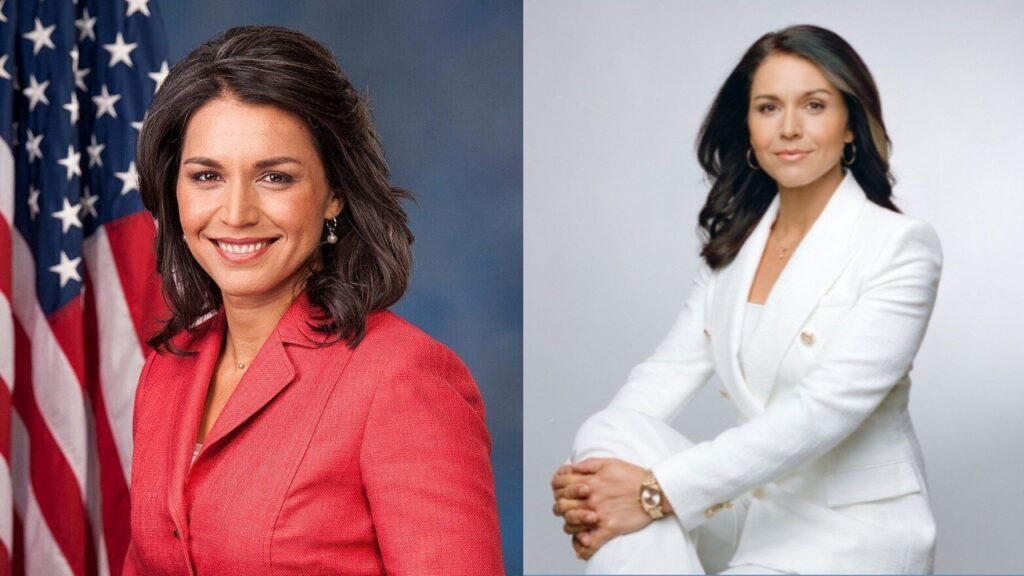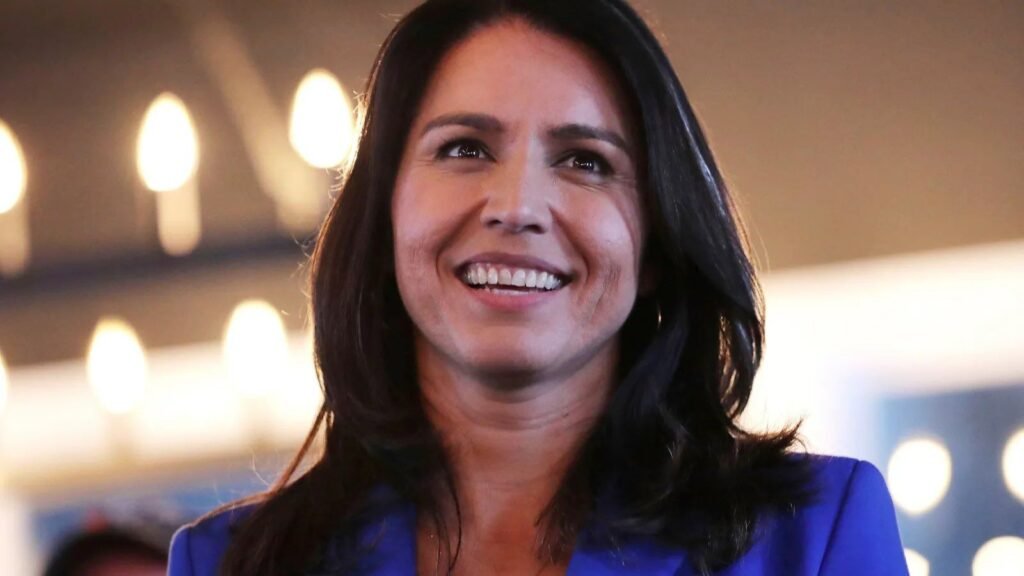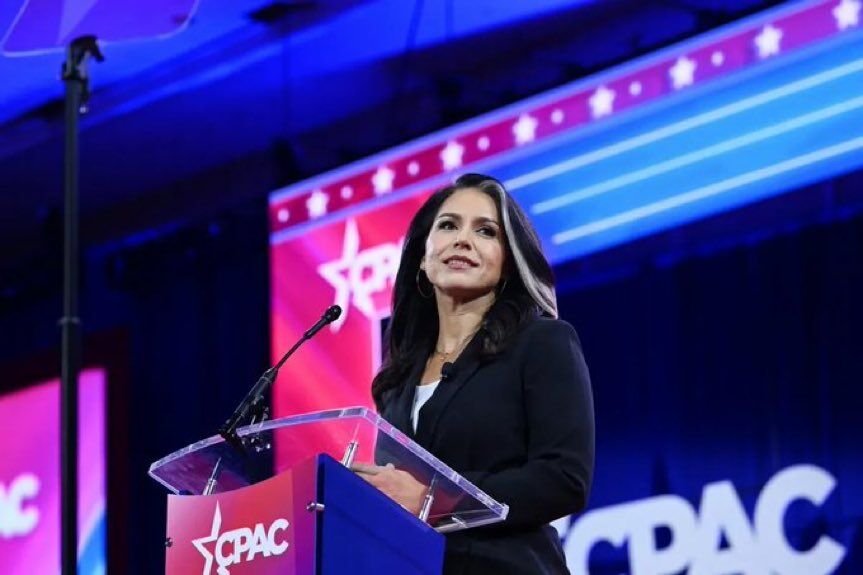Tulsi Gabbard Supports Trump: Analyzing The Reasons And Reactions
- Leave a Comment
- James M
- August 27, 2024

The political world has taken notice of former Representative Tulsi Gabbard’s surprising endorsement of Donald Trump.
During the annual conference of the National Guard Association in Michigan, Gabbard, a Democrat who campaigned for president in 2020, declared her support for Trump’s 2024 presidential campaign.
This change in allegiance from a Democratic presidential contender to a well-known Trump supporter emphasizes how much her political views have changed and shows how endorsements are dynamic.
Gabbard’s statement was made on a somber anniversary: it has been three years since a suicide attack at the main airport in Kabul claimed the lives of over 150 Afghan civilians and 13 American service members. As a National Guard veteran who served two tours in the Middle East, Gabbard finds great personal meaning on this date.
She emphasizes her concerns about existing conflicts and what she sees as an increased risk of nuclear confrontation under the present administration, framing her endorsement within a larger critique of U.S. foreign policy.
Her military experience and dedication to national security are further highlighted by the venue of her endorsement speech—the National Guard Association gathering.
This platform allowed Gabbard to connect her views on foreign policy with Trump’s, who similarly criticized the Biden administration’s handling of international issues, especially the departure from Afghanistan.
Gabbard’s conviction that Trump could provide a more favorable approach to U.S. military and foreign policy concerns is highlighted by the endorsement.

The Declaration
On August 26, the day that marked the third anniversary of the catastrophic suicide bombing at Kabul’s major airport, Tulsi Gabbard proclaimed her support for Donald Trump.
This horrific incident, which claimed the lives of over 150 Afghan civilians and 13 American combat members, is a gloomy turning point that greatly affects Gabbard.
Her decision to provide the endorsement on this particular day demonstrates both her continued interest for U.S. foreign policy and her personal tie to military service.
In her remarks, Gabbard sharply criticized the present administration, claiming that the United States is on the verge of nuclear war and is dealing with an unprecedented amount of international turmoil.
She argues that the Biden administration’s approach to foreign affairs has increased strain between nations and led to regional instability.
Her comments reveal a deep-seated annoyance with what she considers to be the administration’s shortcomings in upholding world peace and managing foreign affairs.
Gabbard’s support is a calculated strategic match with Trump’s foreign policy beliefs rather than just a token political gesture. By supporting Trump, she is embracing his position against needless military operations and on lowering American involvement in international crises.
This convergence supports Gabbard’s view that Trump’s foreign policy strategy could more effectively handle the matters she considers crucial, especially the necessity of preventing future military escalation.
Her support comes at a time when the message she wants to get across is stronger. By associating her endorsement of Trump with the anniversary of a momentous military catastrophe, Gabbard emphasizes her dedication to reconsidering U.S. foreign policy from the perspective of strategic caution and military sacrifice.
Her support is framed by this sad occasion as a call to reevaluate the direction that U.S. foreign policy is currently taking and the possibility of change under Trump’s leadership.
I was a Democrat for over 20 years. Today, I endorsed Donald Trump for President. WATCH to hear why: pic.twitter.com/lwA8FYFx8h
— Tulsi Gabbard 🌺 (@TulsiGabbard) August 26, 2024
Trump's Reaction
Following Tulsi Gabbard’s endorsement, Donald Trump responded with his customary compliments regarding her rank and length of service in the military.
During the National Guard Association’s annual convention, Trump emphasized Gabbard’s accomplishments, mentioning her several overseas deployments and her esteemed status as a lieutenant colonel in the Army Reserve.
He stressed in his address that his acknowledgment of her service was not merely a formality but rather a sincere appreciation of her military efforts.
Trump’s gratitude for Gabbard’s service is indicative of his larger propensity to respect military experience and identify with veterans and active military personnel.
Using the occasion, Trump attacked the Biden administration’s management of the pullout from Afghanistan, characterizing it as a disastrous failure.
He maintained that American credibility and respect abroad had significantly decreased as a result of the administration’s policies.
Trump accused Vice President Kamala Harris and President Joe Biden of mishandling the withdrawal, which left the United States in a chaotic and embarrassing situation.
This criticism is in line with his larger thesis, which holds that U.S. interests are harmed by the foreign policy choices made by the current government.
The purpose of Trump’s remarks was to highlight the administration of Joe Biden’s alleged shortcomings in handling foreign policy and upholding US power abroad.
Through emphasizing the detrimental effects of the departure from Afghanistan, Trump positioned himself as a more capable replacement who could reestablish American authority and credibility.
His remarks are in line with his campaign’s goal of undoing the mistakes he believes the present administration made and strengthening American influence abroad.
The endorsement of Gabbard and the criticism of the Biden administration bolstered the political narrative of Trump. With Gabbard’s endorsement, Trump sought to gain support from voters who were similarly troubled by U.S. foreign policy, and he took advantage of the occasion to criticize the existing administration.
This calculated reaction demonstrates how Trump plans to use criticism and endorsements to fortify his candidacy in the next election and win over more supporters who are worried about foreign policy and national security.
Harris-Biden have embroiled us in multiple wars around the world and pushed us closer to nuclear war than ever before. One of the main reasons I’m supporting President Trump is because I believe he will walk us back from the brink of nuclear war and put us on the path towards… pic.twitter.com/89sCQSRCxC
— Tulsi Gabbard 🌺 (@TulsiGabbard) August 27, 2024
Tulsi Gabbard has always taken a firmly anti-interventionist position when it comes to international policy. Gabbard has been an outspoken opponent of US engagement in a number of foreign crises, including as Syria and Afghanistan, throughout her political career.
Her critiques stem from her opinion that these interventions have been expensive—both in terms of money and human lives—while falling short of the desired results. instability.
According to Gabbard, rather than resolving underlying concerns, ongoing military participation in these places has simply served to prolong conflict and exacerbate regional instability.
Regarding the U.S. military aid to Ukraine, Gabbard is skeptical, which is a source of conflict in her larger foreign policy outlook. She has expressed doubts about the wisdom and ramifications of providing military assistance to Ukraine, especially in light of the ongoing war with Russia.
Gabbard’s viewpoint is consistent with her larger criticism of American foreign policy initiatives, as she feels that these moves frequently have unforeseen repercussions and further ensnare the United States in convoluted international conflicts.
This anti-interventionist position closely resembles the foreign policy strategy of Donald Trump. The Trump administration was characterized by a comparable lack of confidence in protracted military operations overseas.
His administration consistently pushed for a more circumspect foreign policy and stressed the need to lessen American engagement in international wars.
By supporting Trump, Gabbard is reflecting her own policy preferences and aligning herself with his larger aim of reducing U.S. military commitments and concentrating on domestic issues.
The agreement that Gabbard and Trump have on foreign policy matters demonstrates a common dedication to lowering US military participation in international wars.
Both have argued against the expenses and repercussions of protracted military operations and called for a review of US foreign policy commitments.
This area of agreement supports Gabbard’s support for Trump since it shows that both parties recognize that the United States’ foreign policy must change to put more emphasis on diplomatic resolutions and lessen its military involvements.

Donald Trump’s support by Tulsi Gabbard will have a big impact on the 2024 presidential election. Her transition from a Democratic contender for president to a Trump backer emphasizes how easily political allegiances may change and how heated the next election is going to be.
With Gabbard’s support, the race takes on a new dimension that might draw people looking for a change and fed up with the present administration’s foreign policies.
Her backing might also have an impact on other disgruntled Democrats or independents who are receptive to Trump’s different viewpoint and who share her worries about US military involvement abroad.
Gabbard’s endorsement is strategically significant due to her military experience and knowledge of global policy. Her and Trump’s agreement on important subjects, like lowering American military participation, puts them on a platform that might appeal to a larger audience that is interested in foreign and national security.
Her and Trump’s agreement on important subjects, like lowering American military participation, puts them on a platform that might appeal to a larger audience that is interested in foreign and national security.
With this endorsement, Trump might gain additional support from those who value being more circumspect and less involved in international matters, which might broaden his support base.
Beyond only endorsing Trump, Gabbard is allegedly active in his preparation for debates, especially ones when Vice President Kamala Harris is the opponent.
This strategic alliance is noteworthy because Gabbard’s personal knowledge of the military and international affairs, along with her observations, might offer Trump insightful viewpoints and talking points.
Her contributions to the debate preparation process could improve Trump’s capacity to refute Harris’s claims and offer a cogent counterargument on matters of foreign policy and national security.
The alliance between Gabbard and Trump is indicative of a larger Republican campaign strategy. By capitalizing on Gabbard’s experience and reputation, Trump hopes to fortify his stance on important matters and win over supporters of a robust but circumspect foreign policy.
This partnership strengthens Trump’s campaign messaging and highlights Gabbard’s endorsement as a valuable tool in the evolving story of the election.
Conclusion:
A noteworthy development in the 2024 presidential race is Tulsi Gabbard’s backing of Donald Trump, which reflects broader political trends and the fluidity of political support.
Her choice serves as a reminder of the malleability of political affiliations and the influence of individual beliefs on electoral dynamics.
By supporting Trump, Gabbard defies the dominant narratives in her old party and unites with a candidate who shares her anti-interventionist viewpoints.
This endorsement highlights a growing trend of political realignment in which campaign tactics and public support are increasingly shaped by the personal experiences and ideas of individuals.
Gabbard’s endorsement might have a significant impact on the 2024 presidential contest. With her backing, Trump may be able to win over more voters who are wary of the US military and its foreign policy.
Furthermore, Gabbard’s assistance in getting Trump ready for debates adds a fresh tactical component that might improve his capacity to address important topics and refute critics’ claims.
Her support could be very important in influencing voters’ opinions and the campaign’s emphasis on foreign policy and national security as the election draws near.
Gabbard’s endorsement of the changing political environment highlights a larger pattern of dynamic and occasionally unexpected political swings.
A candidate’s ability to shape the narrative and influence undecided voters depends on endorsements like Gabbard’s as they negotiate complicated subjects and try to set themselves apart from the competition.
In a political climate that is changing quickly, the influence of these endorsements goes beyond specific campaigns and affects the general direction of political discourse and electoral tactics.
